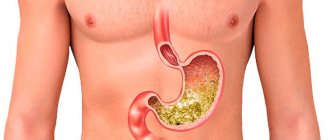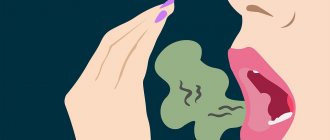Bad breath, which can become a constant companion of a person, can ruin relationships with others and reduce self-esteem. This condition is called halitosis, or halitosis. It is not an independent disease, but is one of the important symptoms of pathologies of the oral cavity and internal organs. You can drown out the stench with mints, spray or chewing gum, but this will not get rid of the problem. We need comprehensive diagnostic measures and subsequent elimination of the causes of halitosis.
Why does there be an unpleasant odor?
The oral cavity is the beginning of the digestive tract. It contains many bacteria; saliva contains enzymes that can break down carbohydrates. Therefore, after waking up, all people have bad breath. But this condition is not considered a pathology; it is enough to brush your teeth for the smell to disappear.
A persistent unpleasant aroma appears after eating dishes with garlic, onions, and some spices. When alcohol is abused, the sour stench persists for a day or more, which is associated with the metabolism of ethyl alcohol in the liver and the release of its vapors through the lungs.
A large number of unpleasant aromas accompany diseases that affect metabolism. In patients with diabetes who do not follow a diet or use insulin incorrectly, when ketone bodies accumulate in the blood, the smell of acetone appears on their breath. People suffering from kidney failure will repel those around them with the unpleasant aroma of urea, which the kidneys cannot remove from the body.
Common causes in adults are pathologies of the digestive tract. Halitosis is caused by:
- gastritis with high acidity;
- stomach ulcer, duodenal ulcer;
- cardiac sphincter insufficiency;
- esophageal diverticula;
- malignant tumors of the stomach or esophagus.
Respiratory diseases can also cause an unpleasant odor. Air from the lungs passes through the oropharynx, so it can partially leave the body through the mouth. It smells unpleasant with purulent diseases of the sinuses, chronic runny nose or tonsillitis.
What diseases does it occur in?
Odor intolerance can occur with the following diseases:
- injury to the brain and cranial nerves;
- surgical intervention in the brain area;
- allergic processes;
- diseases of the gastrointestinal tract;
- tumors and paraneoplastic processes;
- migraine;
- infectious diseases (influenza, meningitis, rubella, measles, botulism, rabies);
- pathological processes in the central nervous system (meningitis, abscesses, cerebral atherosclerosis);
- increased fatigue syndrome;
- mental disorders (hysteria, neurasthenia, psychosis, depression, panic, anxiety disorders);
- endocrine disorders (diffuse toxic goiter);
- toxicosis during pregnancy;
- taking certain medications.
Dental causes of halitosis
When bad breath appears, disease of the teeth or gums is first suspected. Bacteria use leftover food in the mouth to feed themselves. If you brush your teeth incorrectly or completely abandon this procedure, a large amount of plaque accumulates in your mouth. Its rotting causes a repulsive odor. If plaque is not removed for a long time, dense tartar forms, and the stench persists for a long time.
Caries and tooth decay can also cause an unpleasant odor. These are areas where large numbers of microbes accumulate. The breath of people who do not remove decayed tooth roots in a timely manner has a strong smell. A stench can occur when wearing braces, dental plates, dentures, under which food debris accumulates. Any foreign body in the mouth requires additional cleansing.
The condition of the oral cavity is affected by the production of saliva. In some diseases it is not liquid enough. Dryness of the oral mucosa occurs, self-cleaning processes are disrupted and bacterial growth is activated. A similar mechanism works in hot weather or when playing sports, if you actively breathe through your mouth.
Smoking also contributes to the appearance of halitosis. Components of tobacco smoke settle on the teeth and combine with soft plaque. Dry mouth contributes to changes in the composition of saliva and an increase in its viscosity. You can get rid of the smell only by defeating a bad habit.
Classification and characteristics
Odor intolerance may be accompanied by the following symptoms:
- deterioration of health when sensing certain odors (fish, flowers, perfume, varnish, paint, solvent, detergents, human sweat, food debris, etc.);
- feeling odors with greater intensity than other people;
- clear identification of faint odors that other people cannot distinguish at all;
- inability to breathe, especially to take a deep breath;
- involuntary “wrinkling” of the nose and the appearance of a dissatisfied grimace;
- the appearance of mucous, watery, profuse nasal discharge;
- nasal congestion;
- difficulty or impossibility of nasal breathing;
- sneezing;
- dry paroxysmal cough;
- sore and sore throat;
- discharge of tears from the eyes;
- redness of the eyes;
- dizziness;
- headache;
- nausea and vomiting;
- avoiding being in places with unpleasant odors;
- selection of culinary dishes and food products by smell;
- attitude towards surrounding objects and people through the prism of tolerance of their smells:
- excessive cleanliness, washing everything and everyone, washing things;
- nervousness, irritability.
What do different types of smell mean?
Unpleasant odors are caused by several types of volatile compounds produced by anaerobic bacteria. They use food debris on the tongue, between teeth and in carious cavities as a nutrient medium. Depending on the predominant compound, the character of the odor changes. Some of them suggest the pathology that caused halitosis:
- sour aroma – stomach diseases, gastritis or ulcers;
- feces, rotten cabbage - oral pathology, caries;
- smell of urine - kidney failure;
- the smell of ammonia or rotting apples – diabetes;
- rot, rotten meat - esophageal diverticulum.
You can find additional symptoms that will accurately indicate the cause of halitosis. If you have stomach pathology, you will experience pain between snacks. Diabetes mellitus is accompanied by excessive urination, dry mouth and thirst. Caries may not appear for a long time, but in advanced forms toothache appears.
Given the variety of causes, diagnosis, prevention and treatment of halitosis can be performed by doctors of different specialties. You need to see a dentist to get rid of dental diseases, but in other cases you will need to consult an endocrinologist, therapist or nephrologist.
Three main conclusions
1. Have you ever had any strange “stomach reactions” with pain, diarrhea, vomiting or burping after eating fruit or complex foods? If you did, don’t give him these fruits or these dishes anymore.
2. Take a closer look, does the child have a clear aversion to any food or, conversely, an increased craving for certain foods? There is no need to consider your baby’s food preferences as the whims of a well-fed darling. It may very well be that these addictions are based on an instinctive rejection of genetically foreign food or the choice of “one’s own” food. And it’s also not worth “accustoming” to foods that the child cannot tolerate by giving them little by little. This will not increase enzymes.
3. Don’t worry, the vast majority of children “outgrow” the painful manifestations of their constitutional characteristics by the age of 7–8 years. However, let's be honest, everything can come back later - during periods of serious illness, trials and in old age.
Ways to combat unpleasant odor
It is not always possible to independently guess that your breath smells bad. A person does not perceive an unpleasant aroma, so he can judge its appearance by indirect signs. If you have any suspicions, you can use the edge of a spoon to collect plaque from your tongue and smell it. The condition of the saliva is judged by licking the wrist and waiting for it to dry.
You can get rid of an unpleasant odor using traditional methods. At home, a decoction of dill is used to rinse the mouth. At home you can prepare an infusion of medicinal herbs with anti-inflammatory and antibacterial effects:
- chamomile;
- Oak bark;
- sage;
- mint;
- calendula;
- St. John's wort.
At home, a decoction is prepared from a mixture of several herbs to increase effectiveness. The infusion must be highly concentrated to suppress the growth of bacteria and cleanse the oral cavity.
If halitosis is associated with eating foul-smelling ingredients, parsley or celery root will help get rid of it. They block foul odors, and chewing the fibrous structure cleanses the teeth. Observance of a drinking regime relieves halitosis. Clean water cleanses the oral cavity and keeps saliva in a liquid state.
The reason why these methods do not help are pathologies of digestion and metabolism. You can get rid of them at home only under the guidance of a doctor.
Treatment of digestive diseases
If the oral cavity is sanitized, but the smell remains, you need to contact a gastroenterologist. Before treating halitosis, an examination will be carried out to find the cause of the disorders. Gastritis and ulcers are associated with poor diet, but inflammation of the gastric mucosa is supported by Helicobacter bacteria. You need to get rid of them comprehensively.
To do this, the doctor will prescribe the following groups of medications:
- antacids – to reduce acidity;
- antibiotics – drugs to kill bacteria;
- healing agents - bismuth nitrate or De-nol to restore the mucous membrane.
In the treatment of cardiac sphincter insufficiency, when the opening between the esophagus and the stomach does not close, antacids are also used, supplemented with prokinetics that improve peristalsis. Treatment of digestive diseases is impossible without following a special diet.
Is there any cause for serious concern?
Nausea that appears for no reason should always alarm a healthy person. At the first manifestations of the disease, you must urgently go to the hospital for advice and qualified help. You can contact a general practitioner, who will refer you to a gastroenterologist or neurologist.
- If the main cause of the disease is stressful situations, then sedatives are prescribed. Patients take Fitosed, Persen, Novo-passit, Dormiplant, Bromcamphor, Phenibut, Afobazol, Tenoten.
- If problems are identified with the functioning of the brain, then it is urgently necessary to undergo clinical tests and do an MRI.
- Nausea can be caused by diseases that manifest themselves as irritation of the larynx and pharyngeal wall. Such pain occurs in the epigastric zone. After nausea, vomiting mixed with mucus and bile occurs. The skin becomes white with a greenish tint. Fatigue and lethargy appear.
How to improve your oral health
Good hygiene helps get rid of bad breath. If the cause is dense tartar, you need to visit the dentist and remove it mechanically. The toothbrush is powerless in this case.
Any dental defects must be treated. Carious cavities are cleaned and filled, and rotting tooth roots are removed. If necessary, prostheses are installed.
To get rid of the smell, you need to change your toothbrush and choose the right toothpaste. The brush should have medium hardness in order to clean the teeth well and not injure the gums. For better oral hygiene, you can buy a special tongue brush. Toothpaste is chosen based on gum sensitivity and related problems. The dentist will help you choose the product.
To thoroughly clean the spaces between teeth, it is not recommended to use wooden toothpicks. A special thread or brush will do the job better. Some threads contain mint fibers that add a pleasant aroma to your breath. And silver ions will stop the proliferation of pathogenic bacteria.
Teeth should be brushed morning and evening. Before going to bed, after hygiene procedures, you do not need to eat. Leftover food at night will become a breeding ground for the proliferation of microorganisms that damage tooth enamel.
Eliminating other causes of unpleasant odor
It is more difficult to get rid of bad breath that is not related to dentistry. If the cause is metabolic disorders, treatment may take a long time. With diabetes, it is important to achieve stable blood glucose levels. Then the ammonia aroma will not bother you. To do this, patients with type 1 disease carefully select the dosage of insulin, and for type 2 diabetes mellitus, they are prescribed a balanced diet and medications to lower blood glucose.
For those with severe kidney problems, the only way to eliminate the smell of urea is to undergo hemodialysis. This is a method of artificial purification of blood plasma, which helps get rid of metabolic products.
Treatment of tonsillitis and respiratory pathologies is carried out with antibiotics. But with the chronic course of the pathology, this is a long process.
The most common cause of bad breath is improper oral care. By visiting the dentist at least once a year and choosing the right brush, paste and floss, you can avoid the onset of halitosis or treat it at an early stage.
Survey
Since exacerbation of the sense of smell is often caused by dysfunction of specific nerve centers in the brain, consultation with a neurologist is indicated. During the diagnosis, the doctor assesses the degree of impairment of the olfactory function and studies the state of the central nervous system in detail in order to discover the root cause of the symptom. To do this, a comprehensive examination of both the nervous system and the peripheral part of the olfactory analyzer is carried out. The most informative ones are:
- Olfactometry
. Recognition of certain odorous substances from test tubes allows an objective assessment of the quality and degree of increased perception of odors. The quantitative olfactometry method is designed to measure the threshold of smell and the speed of adaptation of the olfactory analyzer. - X-ray examination
. To exclude organic damage to the brain, which could provoke an aggravation of sensations when perceiving aromas, a computed tomography scan is prescribed. If the information content is insufficient, the method is supplemented with MRI for accurate visualization of brain structures. - EEG
. Studying the electrical activity of the brain is necessary for diagnosing pathologies such as epilepsy, migraine, and degenerative neurological diseases. Using electroencephalography, the frequency and amplitude of waves and the presence of foci of increased excitability in the brain tissue are determined. - ENT examination
. All patients with an exacerbation of smell are recommended to undergo rhinoscopy to visualize the mucous membrane of the superior turbinate, which contains olfactory receptors. If suspicious altered tissue is detected, a biopsy and cytomorphological examination are performed. - Lab tests
. For women of reproductive age, the concentration of sex hormones is measured on different days of the cycle. The levels of thyroxine and triiodothyronine and insulin are also assessed. To exclude pregnancy, a blood test for human chorionic gonadotropin is prescribed.
In the absence of neurological causes of a heightened sense of smell, women are prescribed an examination by a gynecologist. If hyperthyroidism or other endocrine disorders are suspected, patients are referred to a specialized specialist for further diagnosis and selection of treatment. If suspicious symptoms are present, a psychiatric evaluation may be required.
Olfactometry - a method for studying olfactory function









